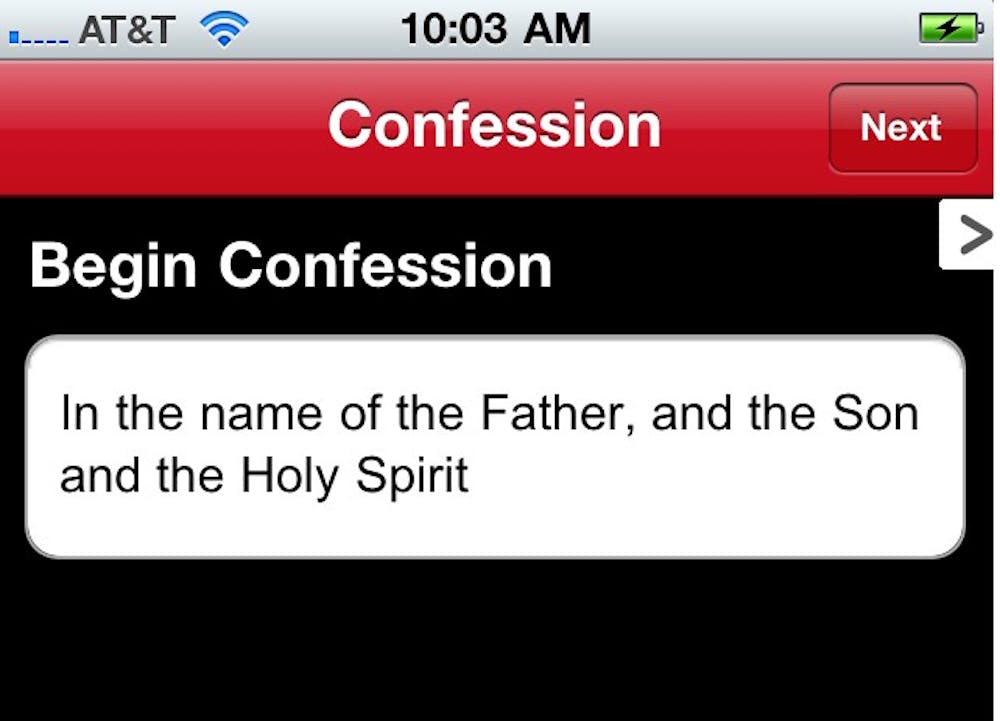(The Beacon)
By Corey Fawcett, Staff Writer -- fawcett13@up.edu
Pope Benedict XVI wants you to go to confession, even if it means you'll be reading to the priest from your iPhone the whole time.
Confession involves acknowledging your sins to a priest in order to have them absolved. In the Catholic faith, it is a sacrament – a sacrament now made easier with a quick visit to itunes.com.
A new Apple application called "Confession: A Roman Catholic App" hit the itunes.com Top 50 Most Popular Apps list just days after its January release.
According to the app's description on the website, "this app invites Catholics to prayerfully prepare for and participate in the Rite of Penance."
No, the app does not give your iPhone the power to absolve your sins. It is not a substitute for real, face-to-face confession. It is meant to help you examine your conscience and figure out what you should say to your priest when you finally have to step inside the confessional box.
How does the app help you examine your conscience?
First, it asks for your age, sex and vocation. Then it administers a list of personalized questions based on your answers while walking you through the Ten Commandments.
Children are asked if they disrespect their parents. Teenagers are asked if they've been bullies. Women are asked if they've had abortions. If you sign in as a middle-aged man and go to the sixth commandment, "Thou shall not commit adultery," you will be asked if you masturbate. All laypeople are asked if they're "guilty of any homosexual activity." Priests are asked if they flirt.
"You wonder how much of this is political," sociology professor Jeremy Tanzer said of the difference between questions directed to priests and those directed to laypeople. "They wanted the Church's blessing."
Each of your lists of sins is password protected, and once you go to confession the lists are wiped away for good. You also have the opportunity to create multiple drafts in case you don't think the first one is adequate enough for your priest.
The creation of the app was inspired by Pope Benedict XVI's Jan. 24 World Communications address. His speech focused on using technology to spread theology and enrich people's faith lives.
"Our desire is to invite Catholics to engage in their faith through digital technology," a spokesperson for the app said in a press release.
"Confession" was created by three Catholic men – Chip Leinen, Patrick Leinen and Ryan Kreager – who run a small company called Little iApps in South Bend, Ind. Two priests, Fr. Thomas Weinandy and Fr. Dan Scheidt, aided in the app's development.
Bishop Kevin Rhoades of the Diocese of Fort Wayne in Indiana officially authorized Catholics to use "Confession," making it the first ever Church-approved app.
"I'm surprised it took so long," Tanzer said of the creation of the app.
According to its creators, one purpose of the app is to encourage people who have strayed from the Church to go back.
"I think it's also about not losing the current generation," Tanzer said. "They've got to do something to make sure they don't lose the younger people."
So far, reviews of the app on iTunes.com have been positive.
"At first there were doubts considering the personal nature of Confession," a user on the website wrote. "After seeing the application and noting the way it works and how it's administered, I see that it was designed as a dignified and respectful examination of conscience."
Theology professor Fr. Charlie Gordon, C.S.C., said he approves of the app as long as it makes confession easier for churchgoers.
"It sounds great to me because you want people to be comfortable when they're examining their conscience, and if they're doing it with technology in their hand, that's fine," he said. "There was probably a time when the examination of the conscience in book form was considered a new idea."
Psychology professor Fr. Jim Lies, C.S.C., agrees.
"Confession is a magnificent sacrament, but people are nervous about it," he said. "If it was clear the iPhone was being used as a means of reflection or examination of conscience, it wouldn't bother me."
Some people, however, are more skeptical of what this app means for the future of the sacrament.
"My only concern is that it replaces the real thing," theology professor David Huchinson said.
Tanzer questions if the app profanes what is sacred.
"What's interesting to me is this dynamic tension. We're stuck between innovation and tradition, and innovation tends to destroy tradition," Tanzer said.
If there's one thing we can conclude from this new app, it's that technology has officially invaded every part of our lives – school, work, friendship and now religion, if you are so inclined.
"Pretty soon there are going to be Skype confessionals," sophomore Nate Packard said.









